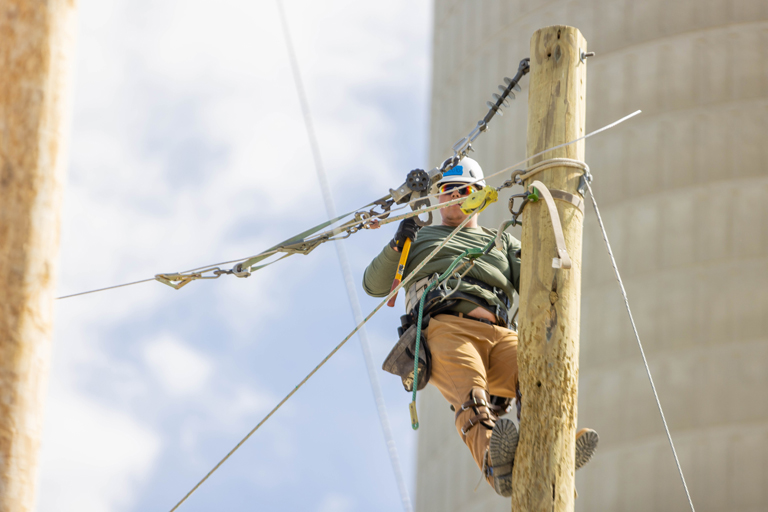If you like to be outdoors, love challenges and aren't afraid of heights, being a professional Lineman is a career to consider.
What is Lineman Training?
Embark on a meaningful and rewarding career in the electrical utility & communications industries. This is accomplished with the use of proven training methods by instructors with extensive experience in the utility industry. Upon completion of the class, students are prepared to enter and be successful in the Line Utility Industry.
Careers in this industry consist of working in conditions such as rain, sleet, snow, dark of night and high winds. Work stations are at an elevated level, so if you have a fear of heights, this career may not be for you. Safety is of the highest priority in this industry so you must always be aware of high voltage areas.
Interested in joining our next class? This program is offered twice per calendar year, February & August, at the Rowan Campus.

Getting Started
What are my degree, diploma, and certificate options?
Upon completion of this program, students will earn 17 college credit hours and a Utility Technician Certificate.
How Do I Pay For This?
- If you are eligible for financial aid, it will not cover 100% of this program. Any remaining balance after financial aid must be paid in full two weeks before the first day of class.
- Tuition includes all training materials, curriculum, books, and tools.
- Tuition must be paid in full two weeks before the first day of class.
- Work Boots (something with a medium heel): $50-$100
- CDL Permit: $85
- The price may vary by student home county.
- We recommend the "CDL PREP" app.
- DOT Physical: $55
- Drug Screen: $47
- No more than 30 days before the start of CDL class.
How Do I Apply?
- Must be at least 18 years of age
- Must have a High School Diploma or GED
- Must be able to pass a DOT Physical and DOT Drug Screen
- Obtain a CDL driver's permit before the first day of class (must have a valid driver's license to obtain the permit.)
- If you live outside of Kentucky, you will not be eligible to complete the CDL portion of this program using a MCTC vehicle.
- Apply to MCTC.
- Register for classes.
- Students MUST register for all classes included in the training: APT 158, APT 159, CPR100, SFA101, and TRU100.
- Submit the Lineworker Application.
Please note that the program of study for admissions and the KY Work Ready Scholarship is Applied Process Technologies.
Selective Admissions
This is a selection program. Your application does not automatically put you in the next available round of training. We start the selection process for the lineman program on the following schedule:
| Semester | Selection Process Begins |
|---|---|
| Fall Program | Mid-June |
| Spring Program | Mid-November |
Submission Documents
- Transcripts - High School and College
- Placement Test Scores - Math (Placement testing is available at MCTC if you do not have test scores).
- Copy of CDL Permit (when beginning the CDL portion of the program)
What Else Do I Need to Know?
What will I Learn?
Through this program, students will receive:
- Lineman Instruction
- CDL Class A Training
- OSHA 10-Hour Course
- Work Zone and Flagging Course
- CPR Certification
- First Aid & CPR Certification
- Drone Pilot Exam Prep
- Rigging
- Electrical Systems
- Basic Electricity
- Career Planning & Strategies
- Personal Protective Grounding
- Transformers
- Material Identification
- Basic Metering
- Substations
- System Operations
- Live-Line Tools
- Maps & Standard
- First Aid
- CPR
- Climbing
- Bucket Truck Rescue
- Class A CDL
- Pole-Top Rescue
- Flagging Training
- OSHA 10
Students are continuously exposed to various elements of accident prevention including:
- Safety rules
- Safety meetings
- Housekeeping
- Near-miss and accident review discussions
- Proper care, use, and storage of tools and equipment
- Tool and equipment inspections
- Proficiencies
Students spend approximately 200 hours in the field performing various introductory training activities. To successfully complete the program, each student must demonstrate that they can perform approximately 80 competencies. These include:
- Tool and equipment operations
- Climbing
- Personal performance
- Simulated emergency storm restoration
- Rigging
- T&D construction, maintenance, and operation
- Digger and bucket truck operation
Upon completion of this program, the graduate can:
- Describe and define the philosophy of safety awareness as it applies to daily lineman operations.
- Demonstrate a safe workplace attitude while performing assigned tasks in the classroom and labs.
- List and explain appropriate OSHA operating standards required for safe work practices in the industry.
- Describe and discuss processes and equipment fundamentals involved in lineman operations.
- Demonstrate working knowledge, vocabulary, and skills of entry-level lineman functions.
- Describe how federal, state, and local safety regulations directly affect the work of a lineman.
- Demonstrate interpersonal skills that are critical to entry-level workforce success.
- Demonstrate the ability to safely operate a CDL-Class A vehicle.
- Demonstrate the ability to perform cardiopulmonary resuscitation.
Request Information

